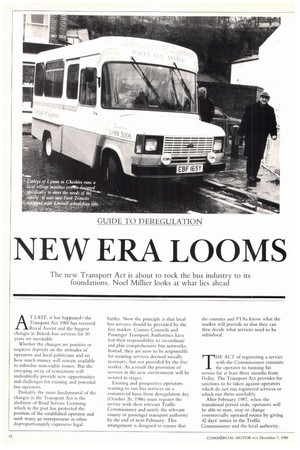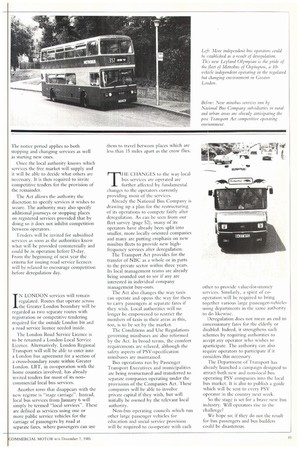NEW ERA LOOMS
Page 44

Page 45

If you've noticed an error in this article please click here to report it so we can fix it.
The new Transport Act is about to rock the bus industry to its foundations. Noel Millier looks at what lies ahead
AT LAST, it has happened—the Transport Act 1985 has received Royal Assent and the biggest changes in British bus services for 50 years are inevitable.
Whether the changes are positive or negative depends on the attitudes of operators and local politicians and on how much money will remain available to subsidise non-viable routes. But the sweeping away of restrictions will undoubtedly provide new opportunities and challenges for existing and potential bus operators.
Probably the most fundamental of the changes in the Transport Act is the abolition of Road Service Licensing which in the past has protected the position of the established operator and sunk many an entrepreneur in often disproportionately expensive legal battles. Now the principle is that local bus services should be provided by the free market. County Councils and Passenger Transport Authorities have lost their responsibility to co-ordinate and plan comprehensive bus networks. Instead, they are now to be responsible for securing services deemed socially necessary, but not provided by the free market. As a result the provision of services in the new environment will be secured in stages.
Existing and prospective operators wanting to run bus services on a commercial basis from deregulation day (October 26, 1986) must register the service with their relevant Traffic Commissioner and notify the relevant county or passenger transport authority by the end of next February. This arrangement is designed to ensure that the counties and PTAs know what the market will provide so that they can then decide what services need to be subsidised.
THE ACT of registering a service with the Commissioner commits
the operator to running his service for at least three months from D-day. The Transport Act provides for sanctions to be taken against operators which do not run registered services or which run them unreliably.
After February 1987, when the transitional period ends, operators will be able to start, stop or change commercially operated routes by giving 42 days' notice to the Traffic Commissioner and the local authority. The notice period applies to both stopping and changing services as well as starting new ones.
Once the local authority knows which services the free market will supply and it will be able to decide what others are necessary. It is then required to invite competitive tenders for the provision of the remainder.
The Act allows the authority the discretion to specify services it wishes to secure. The authority may also specify additional journeys or stopping places on registered services provided that by doing so it does not inhibit competition between operators.
Tenders will be invited for subsidised services as soon as the authorities know what will he provided commercially and could be in operation before D-day. From the beginning of next year the criteria for issuing road service licences will be relaxed to encourage competition before deregulation day.
/N LONDON services will remain regulated. Routes that operate across the Greater London boundary will be regarded as two separate routes with registration or competitive tendering required for the outside London bit and a road service licence needed inside.
The London Road Service Licence is to be renamed a London Local Service Licence. Alternatively, London Regional Transport will still he able to enter into a London bus agreement for a section of a cross-boundary route within Greater London. LRT, in co-operation with the home counties involved, has already invited tenders for most of its noncommercial local bus services.
Another term that disappears with the new regime is "stage carriage". Instead, local bus services from January 6 will simply be termed "local services". These are defined as services using one or more public service vehicles for the carriage of passengers by road at separate fares, where passengers can use them to travel between places which are less than 15 miles apart as the crow flies.
TI I E CHANGES to the way local bus services are operated are further affected by fundamental changes to the operators currently providing most of the services.
Already the National Bus Company is drawing up a plan for the restructuring of its operations to compete fairly after deregulation. As can be seen from our fleet survey (page 52), many of its operators have already been split into smaller, more locally oriented companies and many are putting emphasis on new minibus fleets to provide new highfrequency services after deregulation.
The Transport Act provides for the transfer of NBC as a whole or in parts to the private sector within three years. Its local management teams are already being sounded out to see if any are interested in individual company management buy-outs.
The Act also changes the way taxis can operate and opens the way for them to carry passengers at separate fares if they wish. Local authorities will no longer be empowered to restrict the numbers of taxis in their areas as this, too, is to be set by the market.
The Conditions and Use Regulations governing minibuses are also reformed by the Act. In broad terms, the comfort requirements are relaxed, although the safety aspects of PSV-specification minibuses are maintained.
Bus operations run by Passenger Transport Executives and municipalities are being restructured and transferred to separate companies operating under the provisions of the Companies Act. These companies will he able to involve private capital if they wish, but will initially be owned by the relevant local authority.
Non-bus operating councils which run other large passenger vehicles for education and social service provision will be required to co-operate with each other to provide value-for-money services. Similarly, a spirit of cooperation will be required to bring together various large passenger-vehicleusing departments in the same authority to do likewise.
Deregulation does not mean an end to concessionary fares for the elderly or disabled. Indeed, it strengthens such schemes by requiring authorities to accept any operator who wishes to aparticipate. The authority can also require operators to participate if it considers this necessary.
The Department of Transport has already launched a campaign designed to attract both new and non-local bus operating PSV companies into the local bus market. It is also to publish a guide which will be sent to every PSV operator in the country next week.
So the stage is set for a brave new bus industry. Will operators rise to the challenge?
We hope so; if they do not the result for bus passengers and bus builders could be disasterous.




































































































